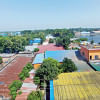434 units at BSCIC estates are either sick or closed

A total of 434 industrial units under the Bangladesh Small and Cottage Industries Corporation (BSCIC) are either suffering over financial issues or have already closed down due to various reasons.
As such, some of these units are not operating at full capacity while others are not generating employment, according to a BSCIC official seeking anonymity.
These units have been rendered sick or closed due to various issues, such as their entrepreneurs facing financial difficulties and subsequently being unable to make loan repayments or meet operational costs.
Also, many are tied up in litigation, including family disputes over inheritance, the official said.
Still, no effective measures have been taken to restart these units. So, the industries ministry must take strict action to resolve this issue, he added.
A report by the BSCIC in July showed that the Jamdani Industrial Estate and Research Centre has the highest number of idle plots with 54 while the Tongi Industrial Estate follows close behind with 28.
Other estates with sick or closed plots include Faujdarhat (17), Rajbari (17), Kalurghat Extension (15), Chauddagram (14), Rajshahi (14), Jamalpur (13) and Kishoreganj (13), as outlined in the BSCIC report.
Entrepreneurs can lease plots from the BSCIC for 99 years.
Established in 1960, the BSCIC is a key government organisation that is responsible for promoting an entrepreneurial society in Bangladesh.
Its mission includes boosting industrialisation and supporting the growth of small and medium enterprises in the country by developing dedicated industrial plots equipped with the required utility services and infrastructure.
Chayan Biswas, assistant general manager of the BSCIC district office in Rajbari, noted that 17 industrial units in their estate have been sick or remained closed for the past five to 10 years.
These include textile and garment factories, Unani medicine production units, and spice and pulse mills.
"An allotment of seven plots was recently cancelled due to prolonged closures and unpaid arrears of the units," he said.
Three of the associated entrepreneurs defaulted on loan repayments after incurring losses and have been unable to restart their businesses.
Biswas added that the cancelled plots will now be reallocated.
Belal Hossain, estate officer of the BSCIC industrial estate in Fouzdarhat of Chattogram, said the sick and closed units in their estate primarily include food, garment accessories, and dyeing units.
"Since Covid-19, several units have become sick or shut down and their owners are struggling to recover, with loan defaults and ownership complications to blame in some cases," he added.
Hossain also mentioned that these issues were raised in the last land allocation committee meeting and a decision may be reached in the next meeting.
GM Robbani Talukdar, deputy general manager of the industrial estate and coordination section at the BSCIC, said several steps were taken to reduce the number of sick and closed industrial units.
As a result, about 100 plots inside the BSCIC estates are being reallocated every year.
"But some old problems remain and that is why some plots become sick or get abandoned every year," he said.
"We also take the initiative to facilitate the transfer of plot ownership if someone wants to do so," he added.
Besides, the policy regarding plot allotment and management in the BSCIC estates and parks has been amended in order to solve the problem of sick and closed industrial plots, Talukdar said.
According to the BSCIC report, entrepreneurs facing financial crises and struggling to reopen their sick or closed units could be provided with loans from the BSCIC or recommended for bank loans.
The BSCIC data shows that there are 12,311 industrial plots under its purview, of which 11,227 have been allocated. The number of industrial units operating in these allocated plots is 6,132.
Among them, 4,719 are in production, and 979 units are under implementation. Additionally, another 1,084 industrial plots are awaiting allocation.
About 30 percent of the country's import-substitute products are manufactured in these estates, which also account for 11 percent of the country's exports each year.
The BSCIC employs more than 6.7 million people and has attracted investments totalling more than Tk 63,318 crore since inception.
Factories at the BSCIC estates focus on various sectors, including knitting and garments, poultry and food processing, leather and leather goods, Jamdani and hosiery, active pharmaceutical ingredients, light engineering and electrical products, plastics, and chemicals.

 For all latest news, follow The Daily Star's Google News channel.
For all latest news, follow The Daily Star's Google News channel. 







Comments